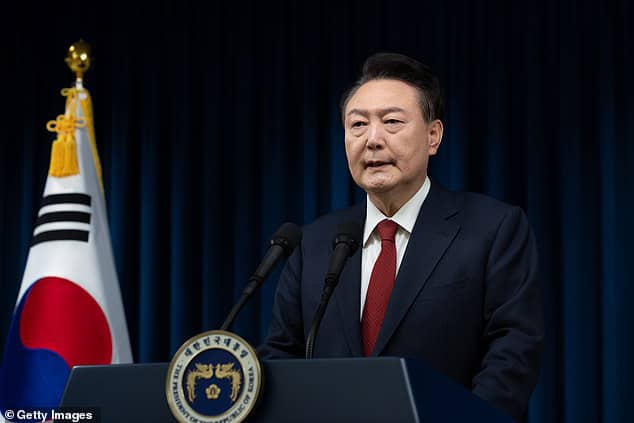International News: Former South Korean president yoon resist arrest for imposing martial law
Impeached South Korean President Yoon Suk Yeol has remained inside his residence, resisting arrest for a third consecutive day on Thursday, after vowing to “fight” authorities who are seeking to question him about his failed attempt to impose martial law. Yoon’s declaration on December 3, which led to his impeachment, has left him facing possible arrest, imprisonment, or even the death penalty.
Supporters and critics of Yoon have gathered outside his residence, while his security team has blocked police attempts to execute the arrest, creating a tense standoff. Despite the ongoing crisis, Yoon remains defiant, issuing a message to his supporters just days before an arrest warrant expires on January 6. He described South Korea as being in danger from both internal and external forces, including “anti-state elements,” and pledged to fight alongside his supporters to protect the nation.
READ ALSO: Anthony Joshua gifts Tinubu signed boxing gloves during courtesy visit
Yoon’s lawyer confirmed that the impeached president is still in the presidential compound, while opposition lawmakers criticized his message, calling it provocative and accusing him of trying to incite violence. Yoon’s legal team has filed an injunction to block the arrest, labeling the warrant as unlawful. Meanwhile, the head of the Corruption Investigation Office (CIO) warned that anyone obstructing the arrest could face prosecution.
Along with the arrest warrant, a Seoul court issued a search warrant for his official residence and other locations. Yoon’s security team has prevented searches, citing South Korea’s Criminal Procedure Act, which restricts seizures from locations containing official secrets without the consent of the person in charge. In the past, similar attempts to arrest lawmakers were thwarted by party members and supporters blocking the police for the duration of the warrants.
The political crisis has its roots in Yoon’s brief martial law order, which aimed to eliminate “anti-state elements” but was quickly reversed after lawmakers voted it down. As a result, Yoon was stripped of his presidential duties and is now facing charges of insurrection. He has repeatedly refused to comply with summonses for questioning, continuing to accuse the opposition of collaborating with South Korea’s communist enemies.
Supporters have gathered in Seoul to back Yoon, voicing anger at the police and displaying anti-impeachment placards. A constitutional court is expected to decide whether to uphold his impeachment. The political turmoil deepened when Yoon’s successor, Han Duck-soo, was also impeached by parliament for failing to sign bills related to investigations into Yoon’s actions. Acting President Choi Sang-mok has vowed to end the political crisis and has moved to appoint two new judges to the constitutional court, a decision that has drawn criticism from Yoon’s staff, who argue it exceeds his authority.


[…] READ ALSO: International News: Former South Korean president yoon resist arrest for imposing martial law […]